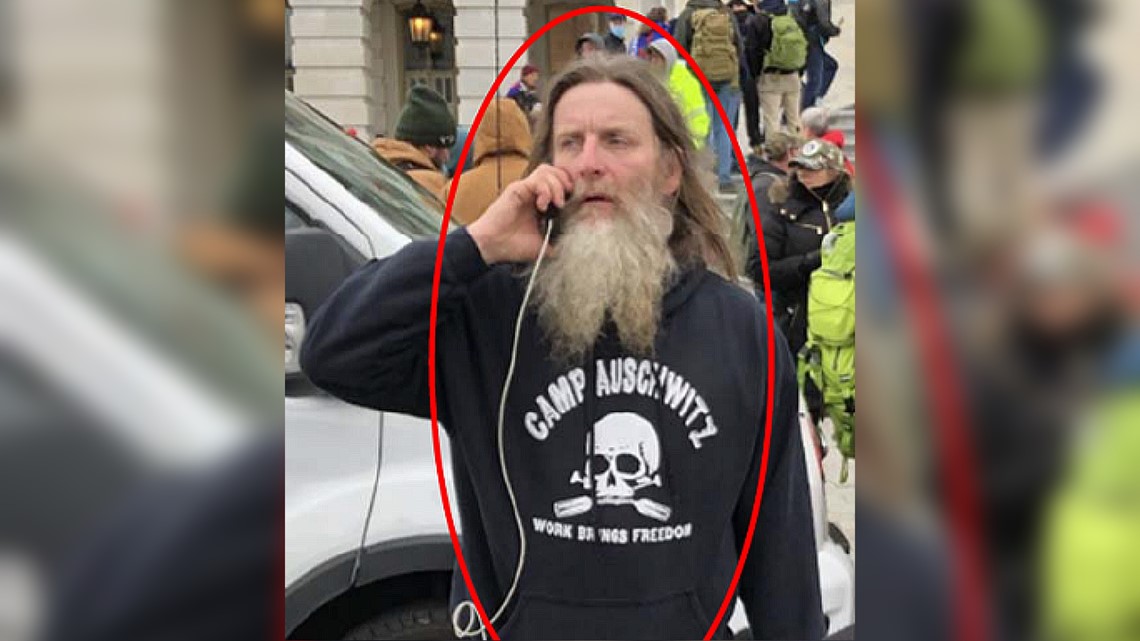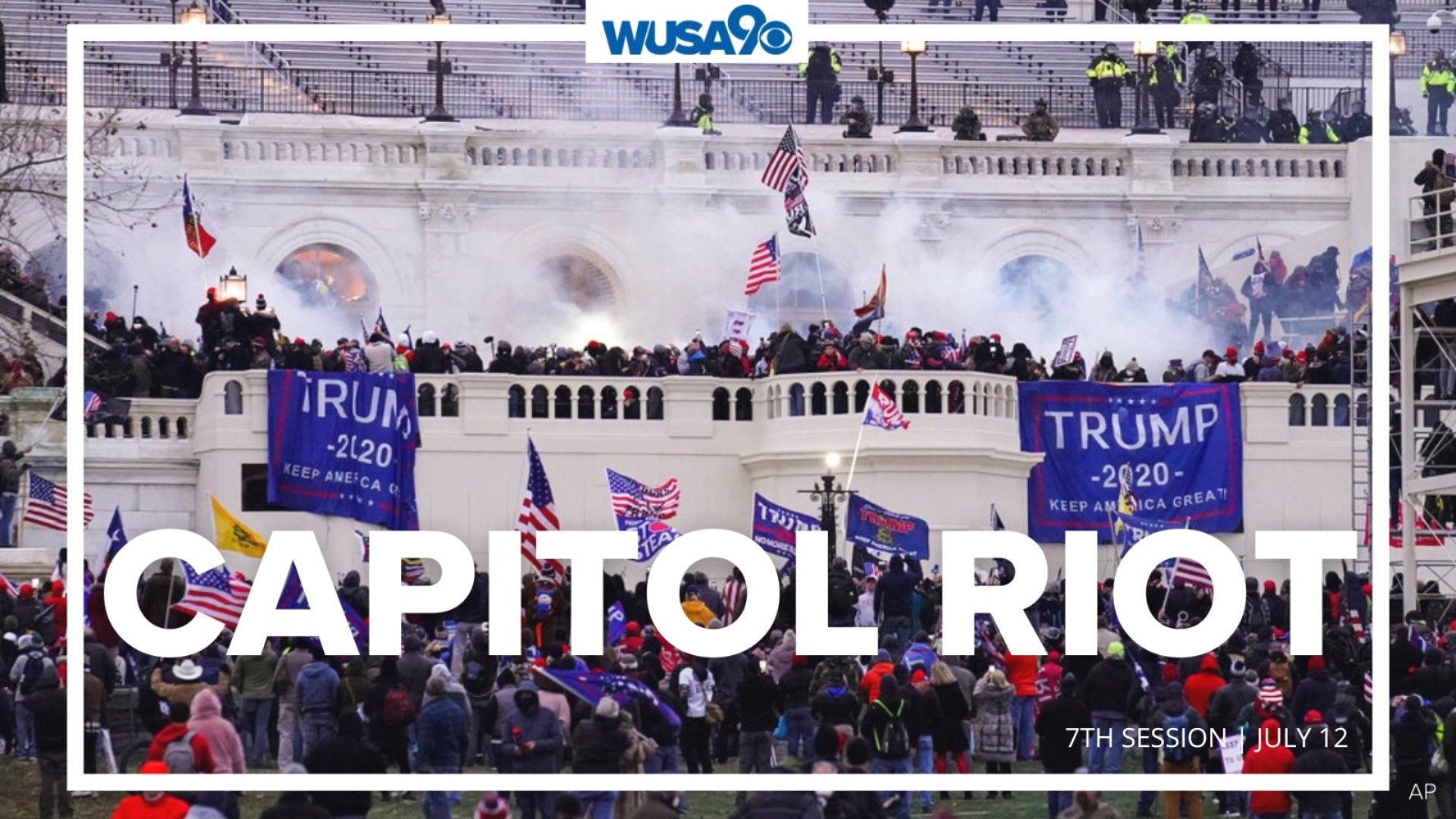WASHINGTON — A federal judge ordered a Virginia man who wore a “Camp Auschwitz” sweatshirt while joining the Capitol riot to serve 75 days in prison Thursday, finding his lengthy criminal history made him stand out from other misdemeanor defendants.
Robert Packer, 57, of Newport News, pleaded guilty in January to one count of parading, demonstrating or picketing in a Capitol building. He was originally scheduled to be sentenced earlier this year, but that hearing was continued at his attorney’s request.
In a sentencing memo filed by the DOJ in May, prosecutors said Packer entered the building just six minutes after the first breach despite a blaring police warning that a riot had been declared. He then joined the mob as it made its way through the building. Though Packer was not himself accused violence, prosecutors said he witnessed the mob pushing through the police line and saw police attempting to vain to repel the overwhelming numbers of people. Packer was just feet away from the Speaker’s Lobby door when another rioter, Ashli Babbitt, was shot and killed attempting to climb through a shattered window.


Packer was arrested a week after the riot thanks in part to a tip from a witness who recognized the “Camp Auschwitz” sweatshirt he wore on Jan. 6. The shirt also featured the words “Work Brings Freedom,” a translation of the of the inscription on the gates of the Nazi concentration camp where more than one million people were murdered during the Holocaust.
That sweatshirt earned Packer international attention, and infamy, according to a sentencing memo filed over the weekend by his attorney, Stephen F. Brennwald. Brennwald said he had received media inquiries "from around the word," as well as contact attempts by unnamed cultural and religious organizations. Brennwald said he rejected those, believe they would create a “circus-like” atmosphere, but that Packer has nevertheless been “hounded” by the media at his home and has lost important relationships because of his role in the riot.
“His own son will not talk to him to this day because of their strong political disagreements, and he lost his employment as a pipe fitter at a good company because of his presence at the Capitol on January 6,” Brennwald wrote.
Brennwald, in his sentencing memo, argued the 75-day sentence prosecutors sought was unwarranted, writing that Packer’s behavior was “truly among the most calm, non-confrontational and non-violent conduct” anyone displayed. Prosecutors, disagreed, saying he showed a “total lack of remorse” and writing that the scenes he observed repeatedly throughout the Capitol made it clear he was breaking the law, “Yet he persisted through until police armed with weapons and in riot gear herded the mob outside.”
In a letter to U.S. District Judge Carl Nichols included with Brennwald’s memo, Packer’s sister said the media had made her brother out to be “some monster that he absolutely is not.” She noted Packer had stepped up to help raise her son following her husband’s death from cancer in 2015.
She also described Packer as “very regretful and remorseful” for his role in the riot – something the DOJ disputed in its memo. Prosecutors said Packer was not completely forthcoming in his FBI interview and falsely claimed to have only been inside the Capitol for a short time, not the more than 30 minutes he actually spent inside.
“When asked why he wore the Auschwitz sweatshirt, he fatuously replied ‘because I was cold,’” prosecutors wrote. “Without express any remorse for being part of the rioting that day, Packer continually said it was ‘hard to tell’ which side people were on.”
Prosecutors also highlighted Packer’s lengthy criminal history which, they said, includes 21 convictions over more than two decades.
On Thursday, U.S. District Judge Carl Nichols highlighted Packer's criminal history, saying it distinguished him from other Jan. 6 defendants who've pleaded guilty to the same crime. Nichols said Packer's behavior at the Capitol was less serious than others that day, but it "wasn't innocuous."
Nichols, a 2018 appointee of former President Donald Trump, said he was convinced Packer's case warranted prison time and that not to order it would send the message to others that his actions on Jan. 6 wouldn't be punished. He ultimately agreed with the DOJ's recommendation and ordered Packer to serve 75 days in prison followed by 36 months of supervised release. He'll also have to pay $500 in restitution for damage done to the Capitol.
During the hearing Thursday, assistant U.S. attorney Mona Furst revealed Packer had also been wearing a t-shirt under the sweatshirt with the word "Schutzstaffel" — the Nazi paramilitary organization known as the S.S. — on it.
Furst said Packer "posted his beliefs on his clothing that day," but Brennwald said Packer didn't agree with that.
"He's very mad that people are calling him a white supremacist, because he doesn't see himself that way at all," Brennwald said.
Packer did not speak at the hearing, and Brennwald, was unable to provide an answer as to why Packer chose to wear the "Camp Auschwitz" sweatshirt — which Nichols referred to as "high offensive" — on Jan. 6. He said he viewed it as a First Amendment issue, though noted he had asked Packer about it himself, without receiving a satisfying answer.
“It seems to me that he wore that sweatshirt for a reason," Nichols said Thursday. "We don’t know what the reason was because Mr. Packer hasn’t told us."
Although other Jan. 6 defendants in felony cases have now been ordered to serve years in prison, the 75 days prosecutors are asking for Packer would be one of the lengthier sentences in a misdemeanor case. John Lolos, a Washington man who used his sentencing hearing to rant about disproven election fraud theories, was sentenced last October to 14 days in jail on the same Class “B” misdemeanor parading charge. Dr. Simone Gold, an anti-vaccine activist who pleaded guilty to a more serious Class “A” misdemeanor of entering and remaining in a restricted building or grounds, was sentenced in June to 60 days in jail. Another parading defendant, Robert Reeder, of Maryland, was sentenced to 90 days behind bars only after new video surfaced just before his hearing appearing to show him grabbing and pulling a police officer onto the ground. Two defendants, Michael Curzio and Carl Dresch, served six months in pretrial detention before being released upon accepting a deal to plead guilty to the parading charge.
We're tracking all of the arrests, charges and investigations into the January 6 assault on the Capitol. Sign up for our Capitol Breach Newsletter here so that you never miss an update.

